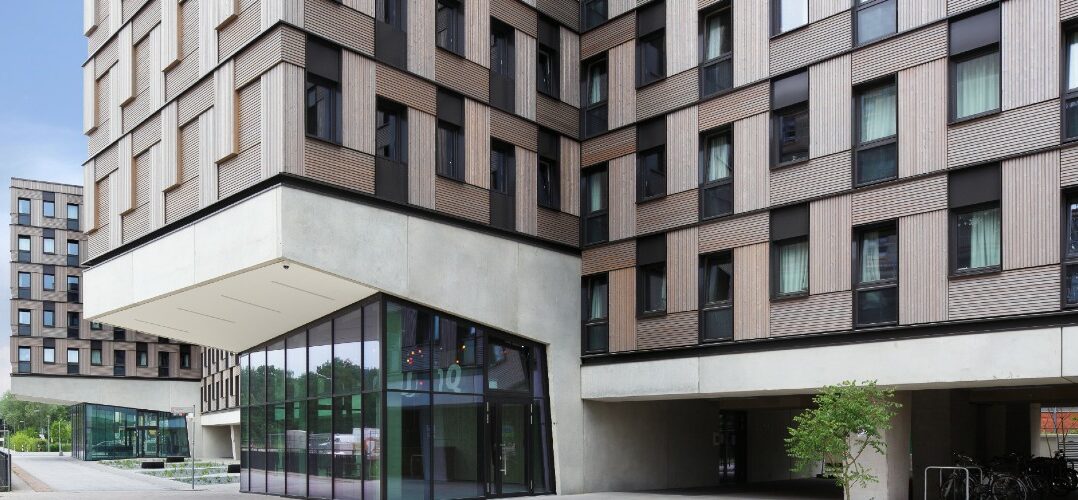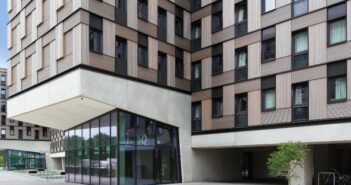Two mega trends are shaping the development of the property sector in Germany and Europe: urbanisation and demographic change. Studies predict that until 2050, more than 80 percent of the German population will live in cities. In the Munich region alone, until 2030, more than 20,000 apartments will need to be built per year in order to address the housing shortage. At the same time, the number of households will increase as more and more people are living alone. According to calculations by the German Statistical Office, 44 percent of all households will be one-person households by 2035.
Thus, the scarcity of living space has become a pressing challenge in large cities all over Europe. In Germany, this is shown amongst others by an ongoing public and political debate about the right measures to create affordable living space. Also, for local governments the issue is on top of the agenda.
Especially one-person households are strongly affected by the housing shortage. This concerns people in different stages of their lives from students, to young professionals, to mobile best agers. They generally prefer a central residence to a couple of more square meters living space. At the same time, these social groups have different needs in terms of wellbeing, service or social interactions.
Today, there is already one asset class that addresses exactly these needs: micro living. The asset class micro living includes the segments student housing, business and serviced apartments. It provides fully furnished residential units for a limited period of time with communal facilities and services. Within the micro living asset class, Corestate already offers a broad range of solutions, not only in Germany – where we are the market leader – but also in other European countries such as Poland and Spain.
The search for new building concepts
Considering urbanisation and demographic change the property sector is facing the question: What should innovative building concepts look like that have to take into account the following aspects: On the one hand there is the scarcity of housing in large cities and the associated price development. On the other hand the changing needs of modern societies, especially with regard to sustainability.
At Corestate, we are exploring a new building concept to answer this question: pre-fabricated timber modules. These modules can be used to densify existing urban space, as they can be placed on top of existing buildings – for example on rooftops of carparks, shopping centres or other types of city buildings. We are building on our expertise in the area of wood construction methods: Corestate already realized the student housing complex “Woodie” in Hamburg with apartments completely made of wood. “Woodie” won the MIPIM-award 2019 in the category “Best Residential Development“.
Corestate is partnering with TheBoxx Solution, as they provide state of the art timber module constructions for micro living projects but also in other asset classes. The modules are pre-fabricated and ready to be installed on site, which offers various advantages during the building process: Pre-fabricated cross laminated timber (CLT) modules can shorten the construction time by up to 50 percent. This has an impact on building costs that can be reduced by up to 30 percent. And wooden buildings are very durable – they can reach a lifetime of several hundred years.
Timber construction is already a growing trend: The German authorities have admitted more wooden buildings within the last years. Two years ago, they already made up 18 percent of annual building permissions – with an increasing tendency. The city of Munich for example has declared their goal to become the leading wood building city in the world. With 570 flats, the city is already planning the largest coherent wooden housing scheme in Germany.
Timber modules – a sustainable building product
What is more, the benefits of timber constructions are evident when it comes to ESG. Why is that so important? The real estate sector is one of the key sectors in the European Union to reduce EU-wide CO2-emissions. With a share of 36 percent of the overall EU carbon dioxide emissions, real estate buildings are the biggest single polluter in the EU. Ambitious plans such as the EU Green Deal will on the one hand further increase the pressure on the property sector to reduce CO2-emissions and on the other hand push up demand for sustainable real estate investment products.
Wood is a natural building material and thus offers many advantages from an ESG perspective. It acts as a CO2 storage whereas the production of steel and concrete for conventional building materials sets free large amounts of CO2. Also, timber modules reduce the energy consumption of a building as they are very energy efficient. The modules are produced locally in Bavaria and the woods used comes from a regional, sustainable forestry. In addition, they can be fully recycled or used for other purposes. And finally, wood is a health-promoting material. In a nutshell, pre-fabricated timber modules tie perfectly into Corestate’s ESG strategy and underpin our role as first mover in the industry. Corestate very early recognized the rising demand for ESG compliant investment products. Therefore, we are now able to satisfy the investors’ demand as one of the pioneers with customizable sustainable investment products.
As one of the leading European real estate investment companies, it is our responsibility to help tackle the property industry’s CO2 footprint. Since we are not only able to offer investments in modular timber constructions within Germany but also in other European countries, we are supporting the EU’s efforts to fulfil CO2-emission targets across various member states.
Links:
https://corestate-capital.com/corestate-produkte-assetklassen/mirco-living/
https://corestate-capital.com/unternehmen/esgvironmental-social-governance/
https://www.theboxx-solution.de/
Top Image: Micro living asset “Woodie” in Hamburg

